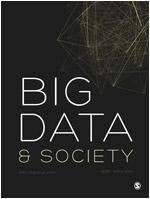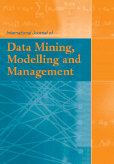
Big Data & Society
Scope & Guideline
Exploring the Nexus of Data and Society
Introduction
Aims and Scopes
- Critical Data Studies:
The journal emphasizes critical perspectives on data practices, exploring how data is produced, managed, and utilized across different sectors, including healthcare, policing, and social media. - Ethics and Governance of Data:
Research addressing the ethical implications and governance challenges associated with big data technologies and artificial intelligence is central, particularly concerning privacy, accountability, and bias. - Socio-Technical Interactions:
The journal investigates the socio-technical dimensions of big data, including how data technologies intersect with social structures, cultural practices, and power dynamics. - Interdisciplinary Approaches:
Big Data & Society encourages interdisciplinary methodologies, drawing insights from sociology, anthropology, political science, computer science, and more to understand the multifaceted nature of data. - Global Perspectives:
The journal includes research that examines data practices in a global context, particularly focusing on issues of coloniality, inequality, and the impact of data on marginalized communities. - Innovations in Data Technologies:
Exploration of emerging data technologies, including blockchain, AI, and machine learning, and their implications for society, governance, and ethical practices is a significant focus.
Trending and Emerging
- Data Activism and Justice:
There is an increasing focus on data activism, exploring how communities mobilize against data injustices and advocate for equitable data governance practices. - Algorithmic Accountability:
Research on the accountability of algorithms has surged, particularly concerning their role in decision-making processes in various sectors, including law enforcement, healthcare, and employment. - Participatory Approaches to Data Governance:
Emerging themes highlight the importance of participatory methods in data governance, emphasizing stakeholder engagement and co-design in developing data policies. - Impact of AI on Society:
The implications of artificial intelligence on social structures, including issues of bias, discrimination, and ethical considerations, are increasingly prominent in the journal's publications. - Environmental Data and Sustainability:
Research linking big data practices to environmental sustainability and climate change is becoming more prevalent, reflecting a growing awareness of the ecological implications of data. - Intersectionality in Data Studies:
There is a rising interest in intersectional analyses of data practices, exploring how race, gender, and socio-economic status intersect to shape data experiences and outcomes.
Declining or Waning
- Traditional Quantitative Methods:
There has been a noticeable decline in papers utilizing traditional quantitative methodologies in favor of qualitative and mixed-method approaches that emphasize critical analysis and context. - Narrowly Defined Technical Frameworks:
Research that strictly adheres to technical frameworks without considering socio-political implications is less frequently published, indicating a shift towards more integrative and critical perspectives. - General Data Analytics:
Papers focused on generic data analytics without a critical lens or societal implications are appearing less often, as the journal seeks to prioritize discussions that critically engage with the ethical and social dimensions of data. - Technology-Centric Narratives:
There is a reduction in technology-centric narratives that celebrate data technologies without critique, reflecting a growing focus on the critical examination of the societal impacts of these technologies. - Historical Data Analysis:
While historical perspectives remain relevant, there is a decreased emphasis on retrospective analyses of data practices in favor of forward-looking research that anticipates future implications.
Similar Journals

Information and Organization
Shaping the Future of Organizational Behavior and Information SystemsInformation and Organization is a leading academic journal published by ELSEVIER SCI LTD, specializing in the dynamic fields of Information Systems, Library and Information Sciences, Management Information Systems, and Organizational Behavior. With an impressive Impact Factor that reflects its esteemed reputation, this journal enjoys a Q1 ranking in multiple categories, highlighting its significance in both research and practical applications. Established in 1996, the journal has paved the way for innovative research, fostering a community of scholars and practitioners who are dedicated to exploring contemporary challenges and opportunities in information management and organizational practices. While primarily available through subscription, the journal's impact resonates globally, making it an essential resource for researchers, professionals, and students eager to advance their knowledge and contribute to the evolving discourse in these crucial areas. With its rigorous peer-review process and a focus on cutting-edge topics, Information and Organization is committed to disseminating high-quality research that informs practice and policy, ensuring its critical role in shaping the future of information and organizational studies.

Big Data Mining and Analytics
Shaping Tomorrow's Technologies with Big Data InsightsBig Data Mining and Analytics, published by TSINGHUA UNIVERSITY PRESS, stands at the forefront of interdisciplinary research in the fields of Artificial Intelligence, Computer Networks and Communications, Computer Science Applications, and Information Systems. With an impressive Q1 ranking in multiple categories as of 2023, this journal serves as a critical platform for researchers and professionals eager to explore innovative techniques and methodologies related to big data analytics. Since its transition to Open Access in 2018, Big Data Mining and Analytics has aimed to increase the visibility and accessibility of its cutting-edge research, making permanent strides in the global academic landscape. Housed in Beijing, China, and actively embracing the converged years from 2018 to 2024, the journal aims to cultivate a rich discourse on emerging trends and applications, ensuring its relevance in a rapidly evolving technological environment. Join a vibrant community of scholars dedicated to advancing the frontiers of knowledge in big data.

International Journal of Data Mining Modelling and Management
Transforming Data into Decision-Making PowerInternational Journal of Data Mining Modelling and Management, published by InderScience Enterprises Ltd, is a prominent academic platform dedicated to the exploration and advancement of data mining techniques and their applications across various domains. Located in the picturesque environment of Geneva, Switzerland, this journal serves as a crucial resource for researchers, professionals, and students engaged in the fields of Computer Science, Management Information Systems, and Modeling and Simulation. With an ISSN of 1759-1163 and an E-ISSN of 1759-1171, the journal has steadily converged its scope from 2008 to 2024, emphasizing innovative methodologies and dynamic developments in data analytics. Although currently categorized in Q4 for several relevant fields according to 2023 quartiles, the journal is committed to elevating its impact and outreach through rigorous peer-reviewed research, making it an essential read for those aiming to stay at the forefront of data-driven decision-making and management practices. Whether you are a seasoned researcher or an eager student, the International Journal of Data Mining Modelling and Management offers invaluable insights and contributions to the evolving conversation in data science.

Advances in Data Science and Adaptive Analysis
Fostering Collaboration in Data-Driven Discoveries.Advances in Data Science and Adaptive Analysis is a prestigious journal dedicated to the advancement of knowledge within the rapidly evolving fields of data science and adaptive analysis. Published by WORLD SCIENTIFIC PUBL CO PTE LTD, this journal aims to serve as a platform for researchers, professionals, and students to disseminate innovative findings and methodologies. With a focus on interdisciplinary approaches, it invites contributions that explore the application of adaptive techniques in tackling complex data-driven challenges. Situated in Singapore, the journal stands out for its commitment to high-quality research, making significant impacts in the academic community and beyond. Although the journal currently does not offer open access, it remains a crucial resource for those striving to push the boundaries of data science research and its practical applications.

Intelligent Decision Technologies-Netherlands
Fostering Interdisciplinary Insights in AI and Computer Vision.Intelligent Decision Technologies-Netherlands, published by IOS PRESS, is an emerging journal dedicated to the dynamic fields of Artificial Intelligence, Computer Vision, and Human-Computer Interaction. Established in 2007 and continuing through 2024, this journal aims to foster interdisciplinary research and innovation by providing a platform for cutting-edge studies and applications of intelligent systems. While its current impact factor reflects a growing influence within the scientific community, with quartile rankings ranging from Q3 to Q4 in various pertinent disciplines, Intelligent Decision Technologies plays a pivotal role in shaping future research directions. Although the journal does not offer open access, it remains accessible across academic institutions, encouraging researchers, professionals, and students to contribute to and engage with the latest advancements in decision technologies. With a commitment to quality and relevance, this journal seeks to advance knowledge and enhance the understanding of intelligent systems in today's rapidly evolving technological landscape.

Big Data and Cognitive Computing
Elevating Understanding of Big Data Applications.Big Data and Cognitive Computing is a premier open-access journal published by MDPI, dedicated to advancing research in the dynamic fields of artificial intelligence, computer science, information systems, and management information systems. Since its inception in 2017, the journal has established a significant presence, reflected in its impressive categorization within the Q2 quartiles for multiple disciplines in the 2023 rankings. Situated in Switzerland, the journal provides a vital platform for researchers, professionals, and students to publish groundbreaking work and access high-quality articles, enhancing the exploration of big data applications powered by cognitive computing. With an increasing global emphasis on data-driven decision-making, Big Data and Cognitive Computing offers unrestricted access to innovative research findings, addressing both theoretical and practical aspects. The journal's contributions are integral for those looking to stay at the forefront of technological advancements and their implications across various sectors.

Journal of Big Data
Advancing Knowledge in the Era of Big DataJournal of Big Data, published by SPRINGERNATURE, is a leading academic journal dedicated to advancing the understanding and application of big data technologies and methodologies across various domains. Since its inception in 2014, this Open Access journal has gained recognition for its rigorous peer-reviewed research, boasting impressive rankings in multiple categories in Scopus, including Q1 in Computer Networks and Communications and Q1 in Information Systems. With its impactful contributions, the journal is positioned at the forefront of scholarly work on big data, addressing critical topics such as data analytics, storage, visualization, and applied data science. Its global reach and commitment to disseminating knowledge ensure that researchers, professionals, and students have equitable access to groundbreaking findings that empower advancements in technology and information systems. The Journal of Big Data continues to foster collaboration and inspire new research avenues leading to tangible impacts in the field.

Cognitive Computation
Pioneering Research at the Nexus of Cognition and TechnologyCognitive Computation is a prominent journal published by Springer, focusing on interdisciplinary research at the intersection of cognitive sciences and computational methods. With an ISSN of 1866-9956 and an E-ISSN of 1866-9964, this journal has established itself as a leading resource for novel advancements and methodologies from 2009 through 2024. It is categorized in the top quartile (Q1) for 2023 in influential fields such as Cognitive Neuroscience, Computer Science Applications, and Computer Vision and Pattern Recognition. With impressive Scopus rankings including a 14th position in Cognitive Neuroscience and a percentile rank of 88th, the journal serves as a crucial platform for researchers and professionals eager to explore the cognitive processes underlying computational techniques. Although it does not operate under an open access model, the richness of research published within its pages contributes significantly to the academic discourse in these rapidly evolving domains, making it an essential read for scholars and practitioners alike.

International Journal of Data Science and Analytics
Transforming Ideas into Impactful Data SolutionsInternational Journal of Data Science and Analytics, published by SpringerNature, is a leading peer-reviewed journal dedicated to advancing the fields of data science and analytics. Since its inception in 2016, the journal has become an essential platform for researchers, professionals, and students, promoting the exchange of innovative ideas and cutting-edge research. With an impressive categorization in Q2 across multiple domains including Applied Mathematics, Computational Theory and Mathematics, and Information Systems, it demonstrates a notable impact within the academic community, as reflected by its high rankings in various Scopus categories. The journal emphasizes rigorous methodologies and practical applications of data science, making it a valuable resource for those seeking to enhance their understanding and application of data-driven solutions. Although it currently does not operate as an open-access journal, it is committed to disseminating high-quality research that shapes the future of analytics and computation. The journal's headquarters in Switzerland further enriches its international scope, fostering a global dialogue among scholars and practitioners alike.

Law Technology and Humans
Fostering Collaboration in Law, Technology, and HumanityLaw Technology and Humans is an innovative open-access journal published by Queensland University of Technology in Australia. Since its inception in 2019, it has emerged as a vital platform for scholarly discourse at the intersection of law, technology, and society, addressing pertinent challenges and advancements from 2019 to 2024. With categories spanning from Law and Social Sciences to Biotechnology and Information Systems, the journal caters to a diverse audience, achieving respectable rankings within its field—ranked #382 in Social Sciences (Law) and within the 62nd percentile in 2023. As a practitioner or researcher navigating the rapidly evolving landscape of tech law, Law Technology and Humans serves as an essential resource, fostering interdisciplinary collaboration and providing critical insights into the implications of technological innovation. By maintaining an open-access format, the journal enhances accessibility, promoting widespread engagement and knowledge sharing among academics, professionals, and students globally.